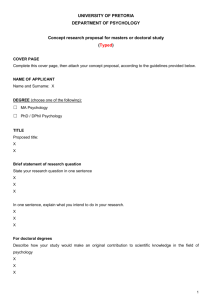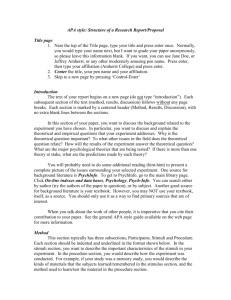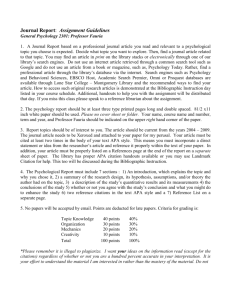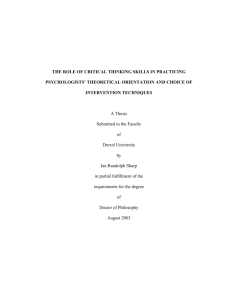Full Research Proposal: MA (coursework
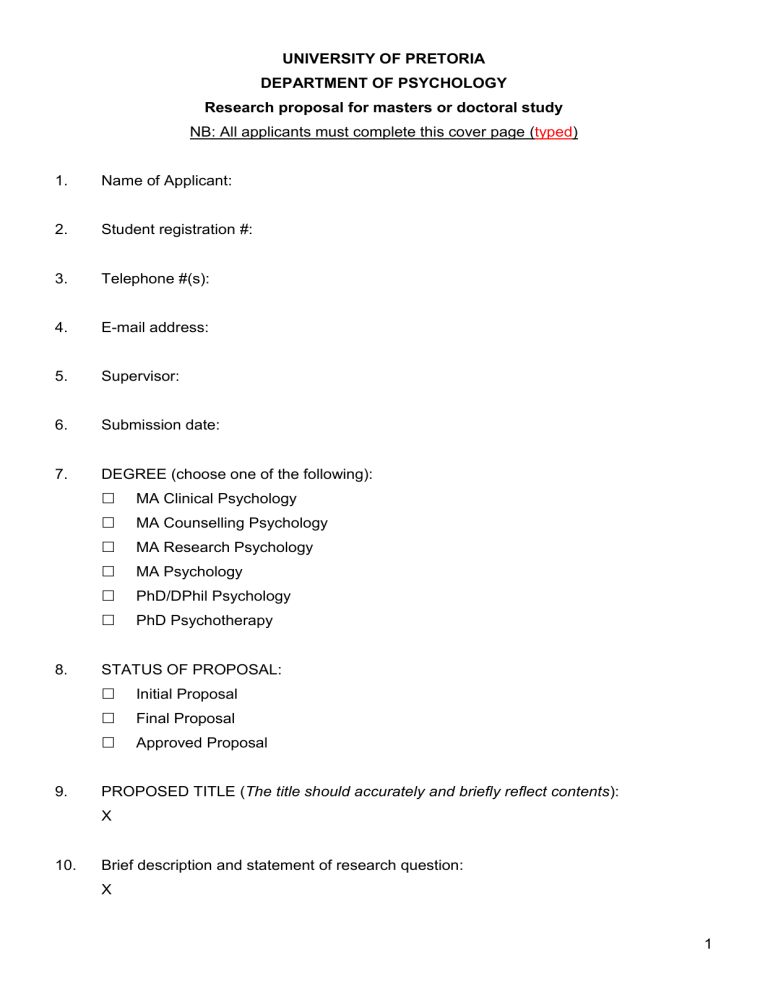
UNIVERSITY OF PRETORIA
DEPARTMENT OF PSYCHOLOGY
Research proposal for masters or doctoral study
NB: All applicants must complete this cover page ( typed )
1. Name of Applicant:
2. Student registration #:
3. Telephone #(s):
4. E-mail address:
5. Supervisor:
6. Submission date:
7. DEGREE (choose one of the following):
MA Clinical Psychology
MA Counselling Psychology
MA Research Psychology
MA Psychology
PhD/DPhil Psychology
PhD Psychotherapy
8. STATUS OF PROPOSAL:
Initial Proposal
Final Proposal
Approved Proposal
9. PROPOSED TITLE ( The title should accurately and briefly reflect contents ):
X
10. Brief description and statement of research question:
X
1
CRITERIA
Format of research question : Must be stated in a question format.
Good research questions share the following characteristics
: o They have not been investigated before o They state the problem clearly and completely o They contain specific aspects that will be focused on o No presumptions about the outcomes of the study are specified, i.e. wanting to prove something as true o They should not make value statements, i.e. moral judgements about what is good or bad, right or wrong
In one sentence, explain what you intend to do in your research:
X
11. Research Problem
Provide a clear description of the research problem (i.e. what do you want to do?). In doing this, you may wish to consider the following questions:
Where does this research question come from?
Clarify or quantify any concepts that might not be clear
CRITERIA
Delimitation of scope of study: Must be clearly stated. Must be realistic, practical, and appropriate to the level and kind of degree.
Level of research study: Master
’s level should demonstrate ability to do research according to and within existing boundaries and knowledge; doctoral level to make an original contribution to knowledge.
12. Literature Review
Provide a review of the literature relevant to the research (Who has done similar work?)
CRITERIA
The review must demonstrate to the reader that the researcher is aware of the breadth and diversity of literature that relates to the research topic
The works that you refer to should reflect recent scholarship as well as publications that are considered to be of seminal importance
2
If the study is cross-disciplinary or comparative you need to describe how the different areas of research can be drawn together in a meaningful way
The review should, ideally, lead to and substantiate choice of topic and research method.
13. Justification, Aim and Objectives
Provide a clear argument as to why the research problem is important (i.e. Why do you want to do the research? Why is it important? What benefits could arise from the research at a theoretical or practical level or at both levels?). For example:
…may resolve theoretical questions in your area
…may develop better theoretical models in your area
…may influence public policy
…may change the way people do their jobs in a particular area
…may change the way people live
other contributions, etc.
Also, include in this section the aim(s) and objectives of your research
CRITERIA
Topic should be relevant and choice substantiated, e.g. show how topic needs to be researched within the framework of existing knowledge in the field or due to social needs.
Show what contribution the research will make to existing knowledge and to society. Topic should fall within the discipline e.g. psychology.
Aims and objectives should be clearly stated and substantiated by literature.
14. Theoretical or Paradigmatic point of departure
State the theoretical or paradigmatic point of departure of the study and provide a brief summary of the main assumptions. Also, provide a conceptual framework for the reader so that the research question and methodology could be better understood (What are the assumptions that you are making about how the world works?)
CRITERIA
The outline of the theory should demonstrate that you understand how phenomena would be conceptualised within a specific paradigm (this is not the same as literature about the topic of your study).
3
The theory may or may not be linked to the methodological considerations of your study and this link should be highlighted or argued against.
15. Proposed Research Methodology
Provide a detailed description of the proposed research methodology (How are you going to do the research?). Below are some examples of how this section of the proposal could be broken down. NB : Your method may contain different headings.
Example 1: Quantitative research
Hypothesis
Research design
Sampling
Measurement instruments
Data collection procedures
Data analysis
Example 2: Qualitative research
Research design
Sampling
Data collection strategies/procedures
Data analysis
Example 3: Literature based research
Sources
Methods of analysis
Example 4: Emergent research methodologies
Motivation for the choice of approach
Exploratory phase
Development of research methodology
CRITERIA
Research methodology should be clearly summarised and motivated. The reader should know what the researcher would do, how and why.
The student is reminded that the theory underlying the research methodology is not
(necessarily) the same as the theories used in motivating the topic.
16. Ethical Considerations
Ethics should comply with the guidelines provided by the Faculty Ethics Committee
4
CRITERION
Ethical considerations should be discussed briefly. Show how the ethical issues arising from your study will be dealt with.
17. Dissemination of research results (Optional)
Provide a description of how the research findings will be used or disseminated
Who are the possible audiences?
Which format is most suitable for which audience?
18. List of references
List ALL references in alphabetical order, following the standard, most recent APA guidelines
PLEASE READ THE ADDITIONAL INFORMATION PROVIDED ON THE NEXT PAGE
5
Additional information
Layout
Technical presentation and layout of proposal should reflect the same standards expected of dissertations/theses.
CRITERIA
A preliminary table of contents should be provided.
Proposals must be language edited.
Appropriate, complete and consistent reference technique should be used both in the text and in the reference list. The APA method of reference is the preferred method in psychology.
Language and writing style should be academic and grammatically correct. Logical argumentation and organisation of ideas should prevail.
Success Indicators:
•
Clearly defined research question
•
Appropriate literature provides a background to the problem
•
Use of other sources to identify/support the problem
•
Objectives clearly specified
•
Conceptual framework and theoretical assumptions clearly stated
•
Appropriate design and methodology
•
Promotes further research
•
Preliminary data/pilot study
•
Necessary resources available
Failure Indicators
•
Too long (maximum 10 pages excluding the title page and reference list)
•
Poor structure, language use
•
Inappropriate use of technical terms
•
Research too ambitious
•
No literature review
•
No integration of theory in literature review
•
Literature review copied
•
No theoretical foundation
•
Methods not clear
•
Methods inappropriate
•
No references or bibliography
6
